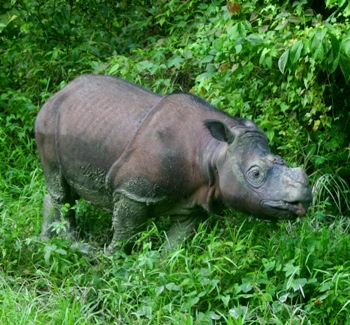By
the end of the year, Malaysia will begin enforcing its new Wildlife
Conservation Act 2010 including stiffer penalties for poaching and other
wildlife-related crimes, such as first time punishments for wildlife
cruelty and zoos that operate without license.
Dr. William Schaedla, the director of the wildlife-trade monitoring group TRAFFIC Southeast Asia, told mongabay.com that "the new law represents the first major revamp of the national wildlife law in over 30 years." The bill will replace the Wildlife Protection Act of 1972.
To better combat ongoing poaching problems in the Southeast Asian country, penalties have been boosted: killing a Sumatran rhino, a Malay tiger, a clouded leopard, or any protected wildlife will now bring a maximum fine of RM 100,000 (31,000 US dollars) and five years in jail or both if they are female or young. The maximum fine drops to RM 50,000 (15,500 US dollars) for male animals. In addition, for the first time setting snares, hunting, or keeping certain species captive—such as rhinos and tigers—comes with mandatory jail time.
Dr. William Schaedla, the director of the wildlife-trade monitoring group TRAFFIC Southeast Asia, told mongabay.com that "the new law represents the first major revamp of the national wildlife law in over 30 years." The bill will replace the Wildlife Protection Act of 1972.
To better combat ongoing poaching problems in the Southeast Asian country, penalties have been boosted: killing a Sumatran rhino, a Malay tiger, a clouded leopard, or any protected wildlife will now bring a maximum fine of RM 100,000 (31,000 US dollars) and five years in jail or both if they are female or young. The maximum fine drops to RM 50,000 (15,500 US dollars) for male animals. In addition, for the first time setting snares, hunting, or keeping certain species captive—such as rhinos and tigers—comes with mandatory jail time.
 A Bornean rhino, a subspecies of the Sumatran rhino, in captivity in Borneo. Researchers believe there are only some 250 Sumatran rhinos left. Photo by: Jeremy Hance. |
For example, the bill also expands protection to more species, including the Asian elephant. Before this new bill, the elephant was considered by Malaysian law as a 'game animal'.
According to the IUCN Red List the Sumatran rhino is Critically Endangered, while the Malay tiger and the Asian elephant are listed as Endangered. These three species are most threatened by poaching, although habitat loss has played a large role in both their historic and ongoing declines. The two clouded leopard species, only recently split into two by taxonomists, are both considered Vulnerable. Although less a poaching target than the other species, clouded leopards are still killed for their coats.
Schaedla says that the success of the new bill in protecting these species will largely depend on implementation. Many countries have stiff penalties for poaching and strong wildlife laws, but fail to catch poachers or punish them with much more than a slap on the wrist.
"How well the new penalties work will depend entirely on how successful enforcement agencies are in bringing poachers and other wrongdoers to justice," Schaedla explains. "The judiciary system must treat wildlife offences as a criminal offence. Offenders must be held liable and be prosecuted to the full extent of the law. For endangered species to be protected, it must be made clear that poaching does not pay."
Schaedla also says that more needs to be done to infiltrate poaching networks: "[Malaysia] should invest more in intelligence led investigations for more effective enforcement. […] More checks at known hotspots throughout the country, at sites that are known to be used as entry-exit points for smuggling wildlife, is needed. To do this, all enforcement agencies—police, customs, army—must work together."
Given that it has taken over thirty years for a new wildlife bill, Shaedla adds that the government should look more frequently at its wildlife trade laws to deal with new situations as they arise.
TRAFFIC is a conservation organization devoted to monitoring the global wildlife trade, encouraging sustainability, and ending illegal trade in species or species' parts.







3 comments:
Stiffer penalty for wild animal poaching will definitely help reduce the illegal poachers. Hopefully the endangered species can be protected with this new Wildlife Law.
Whenever people come across Zoos that operates illegally without license, they should report them to the authorities.
di Sabah, hidupan liar yang perlu diberikan perhatian ialah badak sumatera dan gajah borneo.. kedua2 haiwan unik ini semakin kurang jumlahnya di negeri ini hinggakan NGO terpaksa anjurkan perhimpunan untuk memberikan kesedaran kepada orang ramai..
Post a Comment